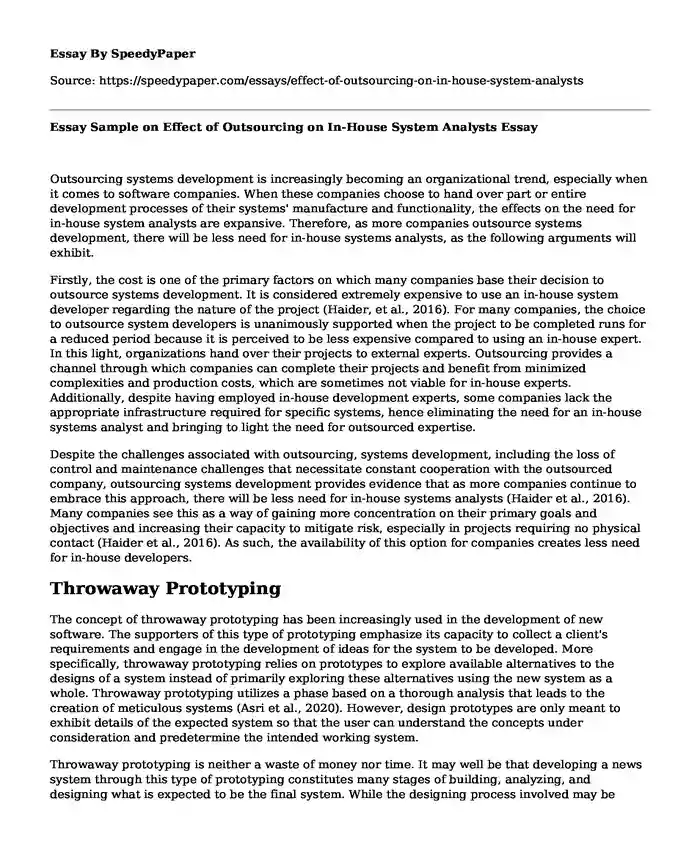
| Essay type: | Analytical essays |
| Categories: | Human resources Information technologies Software Job |
| Pages: | 3 |
| Wordcount: | 719 words |
Outsourcing systems development is increasingly becoming an organizational trend, especially when it comes to software companies. When these companies choose to hand over part or entire development processes of their systems' manufacture and functionality, the effects on the need for in-house system analysts are expansive. Therefore, as more companies outsource systems development, there will be less need for in-house systems analysts, as the following arguments will exhibit.
Firstly, the cost is one of the primary factors on which many companies base their decision to outsource systems development. It is considered extremely expensive to use an in-house system developer regarding the nature of the project (Haider, et al., 2016). For many companies, the choice to outsource system developers is unanimously supported when the project to be completed runs for a reduced period because it is perceived to be less expensive compared to using an in-house expert. In this light, organizations hand over their projects to external experts. Outsourcing provides a channel through which companies can complete their projects and benefit from minimized complexities and production costs, which are sometimes not viable for in-house experts. Additionally, despite having employed in-house development experts, some companies lack the appropriate infrastructure required for specific systems, hence eliminating the need for an in-house systems analyst and bringing to light the need for outsourced expertise.
Despite the challenges associated with outsourcing, systems development, including the loss of control and maintenance challenges that necessitate constant cooperation with the outsourced company, outsourcing systems development provides evidence that as more companies continue to embrace this approach, there will be less need for in-house systems analysts (Haider et al., 2016). Many companies see this as a way of gaining more concentration on their primary goals and objectives and increasing their capacity to mitigate risk, especially in projects requiring no physical contact (Haider et al., 2016). As such, the availability of this option for companies creates less need for in-house developers.
Throwaway Prototyping
The concept of throwaway prototyping has been increasingly used in the development of new software. The supporters of this type of prototyping emphasize its capacity to collect a client's requirements and engage in the development of ideas for the system to be developed. More specifically, throwaway prototyping relies on prototypes to explore available alternatives to the designs of a system instead of primarily exploring these alternatives using the new system as a whole. Throwaway prototyping utilizes a phase based on a thorough analysis that leads to the creation of meticulous systems (Asri et al., 2020). However, design prototypes are only meant to exhibit details of the expected system so that the user can understand the concepts under consideration and predetermine the intended working system.
Throwaway prototyping is neither a waste of money nor time. It may well be that developing a news system through this type of prototyping constitutes many stages of building, analyzing, and designing what is expected to be the final system. While the designing process involved may be lengthy and complicated, each prototype serves as an opportunity to reduce the risk linked to the system by allowing the developers to examine and confirm critical aspects of the system and ensure their understanding before making the actual procedure. Several prototypes' involvement ensures that the final system to be implemented constitutes a design that is rid of functionality and stability issues (Asri et al., 2020). Furthermore, the fact that the prototypes are thrown away when it comes to the final stage of development weighs lightly on this type of prototyping benefits. Even though the prototypes do not evolve into the last system, a fundamental balance is obtained in the final system by refining essential issues making the existing system more reliable, hence a fair use of time and money.
References
Asri, S. A., Astawa, I. N. G. A., Sunaya, I. G. A. M., Yasa, K. A., Indrayana, I. N. E., & Setiawan, W. (2020, July). Implementation of Prototyping Method on Smart Village Application. In Journal of Physics: Conference Series (Vol. 1569, No. 3, p. 032094). IOP Publishing. doi:10.1088/1742-6596/1569/3/032094
Haider, S. A., Samdani, G., Ali, M., & Kamran, M. (2016). A comparative analysis of in-house and outsourced development in software industry. International Journal of Computer Applications, 141(3), 18-22. Retrieved from: https://www.researchgate.net/profile/Syed_Aitzaz/publication/303318785_A_Comparative_Analysis_of_In-house_and_Outsourced_Development_in_Software_Industry/links/574830dc08ae707fe21fb60c.pdf
Cite this page
Essay Sample on Effect of Outsourcing on In-House System Analysts. (2023, Nov 19). Retrieved from https://speedypaper.com/essays/effect-of-outsourcing-on-in-house-system-analysts
Request Removal
If you are the original author of this essay and no longer wish to have it published on the SpeedyPaper website, please click below to request its removal:
- Environment Perception Essay Samples
- Free Essay on Profession: Data Controller for Youth Action
- Essay Example on Leadership Competencies Revisited
- Essay Sample on New Interfaces and New Interactions
- Galileo's Middle Finger (GMF). Essay Sample
- Praxis Discussion - Paper Example
- Paper Example. Military Encryption Framework
Popular categories




